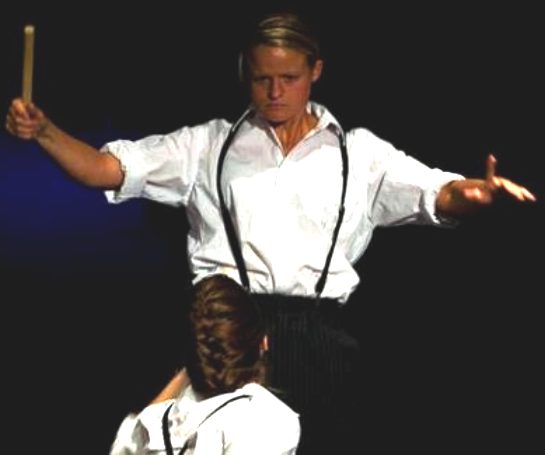|

LYN
GARDNER of THE GUARDIAN is quoted from her Theatre Blog as saying:-
All-female Shakespeare? It's about time
Women will take centre stage at London's Donmar with Phyllida Lloyd's all-star, all-female revival of Julius Caesar – and not a moment too soon
"Sarah Bernhardt played Hamlet, Fiona Shaw has played Richard II and Kathryn Hunter was King Lear, but they were surrounded by men on stage. While all-female productions of Shakespeare are frequent in North America, they are still a rarity in the UK. Perhaps it's simply the case that when you have Shakespeare as your national dramatist, it's harder to separate the plays from 400 years of performance history – a performance history dominated by penises and poetry. As we've discussed before, it often it takes directors from outside the UK to really look at the plays differently and shed fresh light on them.
Not since the 2003 Globe revival of Richard III, which boasted a triumphant Kathryn Hunter in the title role as a gleeful, scampering villain with a highly developed sense of the ridiculous, has there been such a high-profile all-female production at a major theatre. Until now. The news that Phyllida Lloyd will direct an all-female and all-star cast in Julius Caesar (with Harriet Walter as Brutus, Frances Barber as Julius Caesar and Cush Jumbo as Mark Antony) at London's Donmar throws down the gauntlet, particularly at a time when the lack of significant roles for women is being debated.
Its significance lies not just in giving older actors at the top of their game an opportunity to play some mighty fine roles that would normally be denied them, but in the fact that it is taking place at a theatre in the heart of the British establishment. It's a bold and welcome move by the Donmar's artistic director, Josie Rourke, and one that may make us rethink cross-gender casting, just as 30 years ago we began to rethink colour-blind casting.
Nobody now dreams of questioning such casting because it has become a cultural norm. Just as nobody thinks it odd of the RSC's Gregory Doran to stage an all-black Julius Caesar, or the much-admired Propeller to perpetuate the Elizabethan convention of men playing women, there is no reason why all-female Shakespeare can't become a staple of our stages. With its emphasis on politics and conflict rather than gender, Julius Caesar is a good place to start, but the job won't be finished until all-female Shakespeare has as much a place in our theatre culture as classic all-male productions such as Cheek by Jowl's legendary As You Like It."

READERS
RESPONDED TO ABOVE ARTICLE
dfic1999,
4 September 2012 4:43PM
Gardner:
Just as nobody thinks it odd of the RSC's Gregory Doran to stage an all-black Julius Caesar, or the much-admired Propeller to perpetuate the Elizabethan convention of men playing women, there is no reason why all-female Shakespeare can't become a staple of our stages.
Does this mean the cast will be playing them as men, or just grabbing the opportunity to play some meaty roles? We already know that actors of the calibre of Harriet Walter can play big classical roles: on one level, an all-female Shakespeare simply highlights the lack of them in the playwright's work, plus the fact Shakespeare's status means that these days we can pretty much throw any kind of production/casting at the plays and they'll still survive intact.
The comparison to Doran's Julius Caesar is also odd, because the composition of the cast is linked to the setting/context, just as some aspects of integrated casting (which is meant to broadly reflect society at large) can be linked to the director's interpretation of the play, which would not be the case with Lloyd's proposed production as all the cast are women.
Recommend (1)
Responses (1)
Report
Share lyngardner
4 September 2012 5:13PM

Teaser
Poster - Romeo & Juliet
proposed all female cast
Response to dfic1999, 4 September 2012 4:43PM
Don't think we know the answer to your question yet, although I suspect the latter. My experience of all female Shakespeare is that it works less well when the actors impersonate men, but I've had so little chance to see itthat I can't say whether that holds true for all productions. Also there is clearly a difference between a production such as the Globe's female Shrew, which quite clearly throws a light on gender relations and a play like Richard 11 or Caesar which are primarily about politics in the public realm.
Think you are absolutely right about the plays surviving intact whatever we throw at them, whether its gender bending or bouncy castles. Also think I may have muddied water with reference to Doran's revival which of course is set within a particular context, but think it is something to aim for in the future. It's early days.
THE
SMOOTH FACED PLAYERS - In alphabetical order
|

|

|

|

|
|
Mariam
Bell |
Camina
Bernhardt |
Fran
Binefa |
Carly
Jukes |
|
|
|
|
|
|

|

|

|

|
|
Ashlea
Kaye |
Kayleigh
McDonald |
Henri
Merriam |
Leila
Sykes |
LYN
GARDNER
Lyn has been going to the theatre regularly since early infancy. She studied Drama and English at Kent University. She was a founder member of the City Limits cooperative where she edited the theatre section, before joining the Guardian.
A
time lapse rehearsal of Romeo & Juliet
LINKS:
LA
Womens Shakespeare Company
Nickel
Shakespeare Girls
The
Guardian Theatre Blog Sept 2012 Shakespeare
Stratford
Upon Avon - Shakespeare's birthplace
Ashlea
* Camina
* Carly * Fran
* Henri * Kayleigh
* Leila * Mariam
Antony
and Cleopatra * Hamlet * Macbeth
* Othello * Romeo
and Juliet
A
Midsummer Night's Dream * As You Like It
* Much Ado About Nothing
The
Merchant of Venice * The Taming
of the Shrew

A
heartwarming adventure: Pirate
whalers V Conservationists
with
a $Billion dollars riding on the outcome
|









